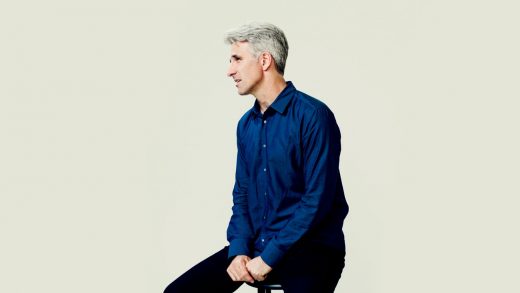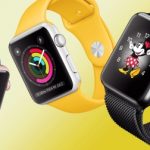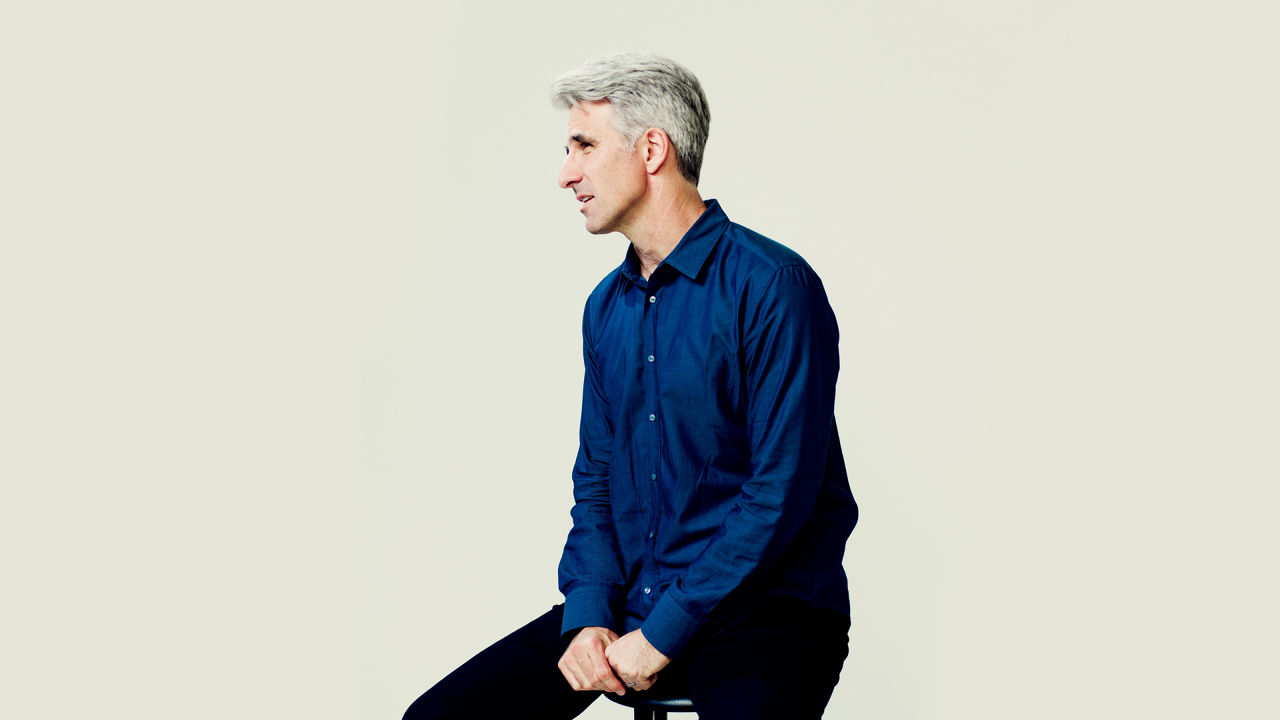Eddy Cue and Craig Federighi Open Up About Learning From Apple’s Failures
Fast Company: Let’s start talking about Maps. How are you developing Maps, and how broadly might it apply as Apple looks ahead?
Eddy Cue, SVP of Internet software and services: The first thing to know about Maps is there’s no one developing maps in a significant way except us and Google. There’s Nokia, and then you’ve got TomTom, which is a relatively small company selling to cars. Even when you hear of a company like Uber doing that, everyone is doing it with a very narrow focus. We use maps in a very, very broad way, and so do our customers.
Another thing about Maps is that it just never ends. Every day, businesses are opening and closing, streets are changing, highways are being built. There are short-term things happening, like particular lanes closing, traffic, a bridge being closed. The whole thing is extremely dynamic, which makes it an interesting problem. Most maps that have been done today are almost old-fashioned. It’s all been drive the road, take photos, do satellite images. The only argument has been, how often do you do it?
The advantage of us coming to this later in the game is that, yeah, we have to do some of that, but in order to stay updated we’re trying to use the iPhone itself, and the data it’s giving us. Let me give you a good example: a golf course. How do we know when a new golf course opens up? We’re not exactly driving around looking for golf courses. But we know it’s there, because there are all these golf apps that get used at a golf course. If we see that all these golf apps are being used at a particular location, and we don’t show that as a golf course, we probably have a problem. You can discover that pretty quickly. It’s not as if you need a year, or anything like that.
FC: Do you then have to drive by that golf course?
Cue: It depends. Some things you can do by just going on the Web and checking out whether a golf course exists at that location. You might look at satellite images to see if there had been construction there. In a worst-case scenario, you would have to drive by. You know, airports are the same thing. Runways get developed, but you don’t always really know because many are private. Roads closing, bridges closing—these are really all data problems, because the truth is we don’t really need anyone to tell us that the bridge is closing. The moment a bridge is actually closed, you can immediately see the effect.
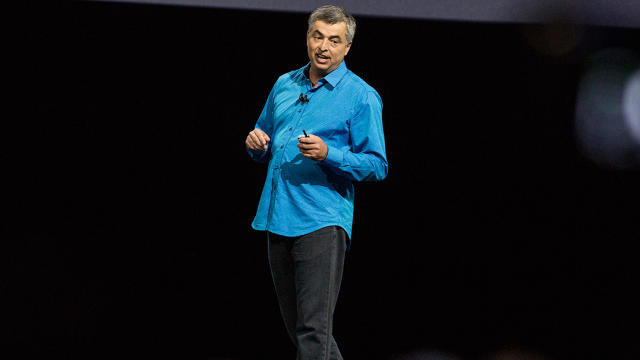
Craig Federighi, SVP of software engineering: If all of a sudden the phones stop moving in that direction . . .
Cue: . . . and they start moving in a different direction . . .
Federighi: That’s the kind of thing we do now. So you draw a distinction between that and personal information. Your device may learn your commute patterns, it may learn when you go to the office and when you go home, so that locally on the phone it could tell you that you need to leave early because there’s a lot of traffic on your way home. Well, that’s something that is personal to you and provides value to you, but we don’t want Apple to know when you go to work. So we keep that intelligence on the device, but we can anonymously track things like traffic patterns.
Cue: Here’s another thing about Maps: It’s expensive. We have thousands of people working on Maps.
FC: Doing things like making sure that golf course gets in there?
Cue: It’s that. It’s building the architectures, doing the automation, the intelligence, the amount of data we’re capturing. It’s very, very expensive, and it doesn’t have a direct revenue stream. So when I say it’s only Google and us who are developing it, well, that’s part of the reason why. You can’t be a company going out and developing maps to make money; at least no one’s figured that out.
FC: In the long run, is the service, to me as an Apple customer, simply that I will have up-to-date Maps of my neighborhood and wherever I drive? Or does it get much bigger than that?
Federighi: I think it already is. To Eddy’s point, while Maps isn’t a revenue-producing product itself, it’s a platform. It’s certainly an important feature in terms of the convenience it provides you, but Maps is a platform on which so many of our developers build. If you think about mobility in general, Maps is a core organizing structure for the physical world in which you interact. So many, many third-party apps incorporate mapping, as an understanding of where you are in relation to others, as a way to do all sorts of things—put photos on a map to help you relive a trip, get a heads up about when you need to leave, or see which of your friends is in a certain area. Just as our operating system is a platform or a foundation, having a map of the physical world is a foundation for building all kinds of value on the platform. Our Maps app is just one client of that underlying platform that’s delivered there.
FC: What does it do to the development team, and to your plans, when something like Maps gets introduced and it’s derided immediately. [Maps was introduced in September, 2012, to universal scorn.] Does that slow down what you were hoping to do?
Cue: Well, look, the first thing is that you’re embarrassed. Let’s just deal with that one fact of emotion. I mean, these things mean a lot to us. We work really hard, and so you’re embarrassed. In the case of Maps, what it causes you to do is ask: How important is this? Is this a place where we need to triple down or quadruple down, or did we make that mistake because it’s not that important to us? We had long discussions at the ET [executive team] level about the importance of Maps, where we thought Maps was going in the future, and could we treat it as a third-party app? I mean, we don’t do every app. We’re not trying to create a Facebook app. We think they do a great job. We always came back to the conclusion that Maps was not one of those. It’s an integral part to the whole platform. There were so many features that we wanted to build that are dependent on that technology, and we couldn’t see ourselves being in a position where that was something that we didn’t own.
Federighi: So it was a triple down, and it was a huge learning moment for Apple. Maps presented us with some relatively new challenges, where we needed to develop competencies that we initially didn’t appreciate, areas where we needed some depth, where we needed to take a new approach. We had great approaches for some of the other problems we’d been solving, but this one had some characteristics that meant we had to take some different approaches. So we had to ask: What do we have to learn?
FC: Was the development process of Maps very much in line with the development process of things you’d done in the past?
Federighi: More than it should have been. Maps is a huge data integration and data-quality issue. Eddy talks about the amount of data you have. You’re getting data from a lot of providers, and some of that data is, or should be, changing every day.
Cue: It may not even be right.
Federighi: And much of it is inconsistent. You’ll get a feed from someone who provides information about restaurants, and they’ll refer to location in a different way, in terms of latitude and longitude, from your base map. There’s a huge data-quality issue there, and I don’t think we initially appreciated all the kinds of technology we would need to do that on an ongoing basis. Going through that lesson in a very public way gave us all the motivation we needed to say we’re going to do this really well.
Cue: And look, we made some significant changes to all of our development processes because of it. For example, the reason you as a customer are going to be able to test iOS is because of Maps. We were never able to take it out to a large number of users to get that feedback. So, to all of us living in Cupertino, Maps seemed pretty darn good. Right? The problems weren’t obvious to us. Now we do a lot more betas.
FC: You guys have a fierce history here, and there were all sorts of rules that were established during Steve [Jobs’s] tenure. This sounds like a case where you were doing something you would not have been encouraged to do in the past.
Cue: No. When you look back, like everything else, it’s easy to see the mistakes. Maps was a new area—not one where we have a lot of experience or expertise. It was important, but we were looking to replace an existing product [analog maps]. So we weren’t looking to create something entirely new. So you’re trying to replace one thing with another thing, and we kind of let the team we put in charge of it go off on their own. Now that you understand the complexity of Maps, you realize that it was a relatively small team, and we kind of isolated them in their own little world. We completely underestimated the complexity of the product. If you think of Maps, it seems like it’s not that hard. All the roads are known, come on! All the restaurants are known. There’s Yelp and Open Table; they have all the addresses. Mail gets delivered; UPS has all the addresses. The mail arrives. FedEx arrives. You know, how hard is this? That was underestimating. And then there was the quality part, of how you test and validate— that is also a big issue. It’s an ongoing one. We’ve improved it significantly, and Google’s improved theirs significantly, but it’s still a problem that needs to be better. For both of us.
Federighi: But we are a company that has learned and adapted as we’ve gone into new domains, during Steve’s time and after Steve’s time. If you look at building mobile consumer devices and what it meant to market and retail those, we were doing lots of things we had never done while we were just the Mac company. Under Steve, that part of the business learned to adapt to that domain, and got really good at it. Under Steve, we got into silicon; we now design and build our own chips. The set of practices, disciplines, expertise, and management approach to releasing a chip that you’re going to fabricate in the billions is a different discipline than the one you’re going to use to design a Mac, or to sell something in retail, or to sell songs in the iTunes Store. So we had to develop that expertise in chips, because it was vital to the experience we wanted to deliver. Maps is yet another domain where we had to learn what we didn’t know. And as we realize that a particular technology or approach is necessary to deliver new experiences, we’re going to learn what we don’t know and adapt our style to address it. There’s not just one way to get things done here.
FC: Eddy, you told me that Siri was a very different case.
Cue: Siri is very different because it was new. When you’re doing something that hasn’t been done, it’s a very different animal. You’re trying to determine what are the features, what are the ways it can work, what are customers looking for, what are the things you can do that will improve the lives of customers. I think that’s still the case with Siri. If you look today, things like Cortana and Google exist, yet there’s still so much to do in that space. There are so many things you’d like Siri to do that it doesn’t do quite do yet.
FC: Can you give me examples of things you’re looking at with Maps?
Cue: Mmmm . . . [He shakes his head no.]
FC: Okay, I had to try. Maps are really interesting though. For years, they’ve been thought of as the possible overlay for all the information in the world.
Federighi: That’s right. It’s the organizing principle for the physical world.
Cue: Here’s a problem Maps should solve: I’m about to get on a red-eye and go to New York. I don’t go there that often, but I’ve gone to places I like. I never remember the name of restaurants. Today you solve that by remembering the type of food, and maybe the neighborhood, but there should be a better way of solving that problem.
FC: By knowing the history of where you’ve been?
Cue: Possibly. I mean, there are better ways to solve that problem than me hunting and pecking. Traffic, by the way, is another one. We do a lot of proactive stuff, but let’s say I’m at work today. If I knew my commute would be cut by 15 minutes, I might stay at work an extra half hour. Maps should tell me that.
FC: [When a family member calls me at this point of the interview, Apple’s Voice Memos app, which I’ve been using to record the interview on my iPhone, stops recording. I lose about five minutes of the conversation. When we get started again—using a different recording app—I ask about the flaw.] Somebody went on a rant (August 22, 2016) about the possibility that the iPhone 7 won’t have a headphone jack. Meanwhile, my recording just stopped after that phone call, which is annoying.
Cue: That’s good, actually. That means there’s still work for us to do.
FC: But here’s the thing. Apple gets hit on two sides. There’s one crew that thinks you’re not as visionary as Google or other places, and another crew that hammers you for detailed errors like this.
Cue: I like the latter; I don’t like the former. I’m okay with the latter.
FC: You’re okay that there are mistakes, and that you have to fix them?
Cue: We have to be honest with ourselves. We’re not perfect, and we’re going to make mistakes. There’s an evolving range of issues that customers have raised that we haven’t addressed, but we’d like to address.
FC: There’s a perception that there are more of these than in the past.
Cue: Well, there’s more people, there’s more devices, and there’s more communications available. I actually think our products have fewer mistakes than they did in the past, and our data shows that. But, look, I tell this to my team all the time. When we were the Mac company, if we impacted 1% of our customers, it was measured in thousands. Now if we impact 1% of our customers, it’s measured in tens of millions. That’s a problem, right—things are going to be perceived differently. Our products are way better than they used to be, but there’s a higher bar, and I’m okay with that. I think that is why we’re here. That’s why I get up every day. I like that people have high expectations of us, and that they care about little things that bother them, which, in a lot of products, they wouldn’t bother about. With other companies, you think, that’s about as good as it’s going to be. With us, you want perfection; you want it to be the best. And we want that.
Federighi: A world where people do not care about the quality of their experience is not a good world for Apple. A world where people care about those details and want to complain about them is the world where our values shine. That is our obsession. If people were like, “That’s good enough for me” . . . well, there are a lot of people who can provide that kind of experience. I think that we are focused on working hard every day to make it better. We make mistakes, things get out there, but we work incredibly hard to make things better and better. The bar does keep going up. The number of things you expect from your phone and your computer and the way they interact, and the cloud and services and the way the Internet works with them, the level of complexity goes up and up. But we’re committed to getting better and better, faster than it gets harder and harder.
Cue: And the former thing that you said, well, that’s our culture. We don’t want to tell the world what we want to solve, what we’re trying to solve. Why? Because we haven’t solved it. Other than trying to make ourselves look cool or good, what’s the purpose of that? I don’t understand that part of it. So, yeah, there are a bunch of things we’re working on that we’d like to solve—some we’ve been working on for years and we haven’t solved, for that matter. I don’t feel like we should be tooting our own horns that we’re trying to solve that problem, when we haven’t really solved it.
FC: This seems to go back to the popular myth about what happened here under Steve. You’re seen as a breakthrough company, and people say that the Watch was supposed to be a breakthrough and it wasn’t.
Cue: I think of us as a company that changes peoples lives with the products we build because they use them in significant ways. Call that a breakthrough—I don’t know. Somebody will argue that we weren’t the first phone. But we were the first ones to do that in a mass way.
FC: You once told me that you brought your family to the iPhone introduction because you knew that was incredibly special. Does the rest of the world expect you to deliver an iPhone every four years?
Cue: Well, I think the rest of the world thinks we delivered it every year while Steve was here. Those products were developed over a long period of time. So, people say the Watch isn’t a breakthrough product. Well, neither was the iPhone, by the way. And neither was the iPod. Go look at the numbers; these were not a huge success right away. A $500 music player? How stupid are these guys?
Federighi: We couldn’t have built the Watch if we hadn’t been solving all sorts of problems on the phones in the first place. And the phone benefited from work we did when we thought we were trying to build an iPad. So, the expertise we developed on mobile silicon, and power management, and iOS were enablers to get that Watch on your wrist. In that sense, we’re constantly innovating and iterating these products, to the point where the phone you have here on the table [an iPhone 6S] is dramatically different than the one we introduced when we introduced the iPhone [in 2007]. Since you can draw a line from one to the other, you think of them as the same thing, but this [iPhone 6S] is probably a thousand times faster. It can ID your fingerprint, it’s the only camera you need, it can run apps—it’s just a dramatically different device. That’s the result of continuous innovation that puts you in a dramatically different place from where you first started.
FC: It’s also much better because of how it connects to the rest of my devices, right? When you think of development, do you think of developing things for that ecosystem or for a particular device?
Federighi: We think in terms of experiences. We all use these devices every day, and we think about what we’d like them to do for us. Those aspirational experiences lead us down all sorts of roads technologically, to all kinds of problems that we need to solve. So we think, “Oh, we’d like your Watch to unlock your Mac,” because we need to unlock our Macs every day. It doesn’t start with, “Hey, we’ve been doing development in wireless and they want something to use their technology for.”
Cue: There’s another thing, too. When everything gets compared to the phone—and it does, and that’s fine—if we do that, we’ll always lose. The phone is a device that everyone on the planet has, and you can’t say that about anything else. So, if we were to go solve the problem of flying a supersonic airplane, that might have significant benefits, but the number of people it impacts is tiny compared to the phone. That comparison is really hard. If I looked at it that way, I’d never do an Apple TV, because there aren’t enough TVs in the world. So, might as well not do that! You can’t look at it that way, and compare everything back to the phone. Then no other product should be created.
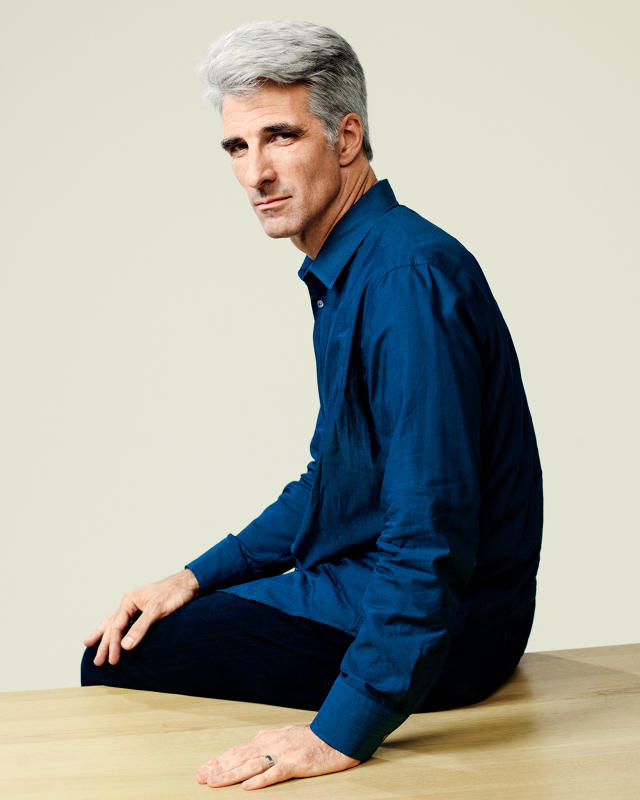
FC: In some companies there’s an innovative side of the company and another where their main job is to sell a lot of the old standby. Is the iPhone becoming the “old” side of the business around Apple?
Cue: It’s not going to become that. Look at the Mac. We still put a lot of effort into that, and it’s 30 years old. If you look at OSX, same thing.
Federighi: The phone is this ubiquitous platform for delivering capability to our customers. It’s the single best opportunity for us to innovate, and the single best opportunity for our developers to innovate into our ecosystem. So this is not “put that on maintenance while we go do something new.” It remains a pillar of what we do, for as far as we can see. It’s not the only pillar of what we do, but it remains the biggest value creation opportunity we have for our customers.
FC: Many people argue that you, Google, Amazon, and Facebook are all after the same thing in the long run: ownership of the customer throughout the day.
Federighi and Cue together: We don’t think of it that way.
Cue: I love Facebook. We can’t be everything. One of the reasons we’ve been highly successful is that we focus. We can’t be great at everything; nobody’s great at everything. I mean, come on. So, if you want to be great at something, you have to focus and do a few things. We’ve been lucky. We’ve had a few, and not just one. That’s the only way we know how to work. So we don’t want to be Amazon and be Facebook and be Instagram and so on. Why? Or Uber. Why? I think it’s awesome that Travis and his team have done Uber on our platform. It would not exist without our platform, let’s be clear. But great for them for thinking of that problem, and solving it. We would never have ever solved that problem. We weren’t looking that way. We would have never seen it.
Federighi: It is an interesting, ongoing press narrative, however. To the extent that anyone anywhere does anything interesting, the question is: Why isn’t Apple doing that; why is Apple behind in that? We aren’t the Everything Company. We take on a very small number of things that we do very well, and we find that pretty rewarding.
FC: I don’t know if you’ll answer this, but supposedly the most important thing for any employee is their relationship with their direct boss. So how is your relationship with Tim different from your relationship with Steve?
Cue [laughing]: How is it different?
Federighi [smiling]: No difference . . .
Cue: I don’t twitch as much, but . . . no, just kidding. I’m kidding. It doesn’t change, in that they’re both extremely demanding. Their approach is completely different. Here’s a feeling that I have always had, and I wish I had it with my team. I never wanted to disappoint Steve. I never want to disappoint Tim. And I have that with, like, my dad. I was here with [former Apple CEO Michael] Spindler and those guys, and I didn’t have it with them. That’s a quality that makes them unique. Now, their approach is very different. Steve was in your face screaming, and Tim is more quiet, more cerebral in his approach. But you have the same feeling. And when you disappoint Tim, even though he isn’t screaming at you, you get the same thing. [They both laugh knowingly.] That part comes through loud and clear.
The thing I love about Tim, and the key to his success, is that he’s stayed true to himself, and never tried to be Steve. There are some qualities that he has that are better than Steve’s, and Steve had some qualities that are better than Tim’s. But he stayed true to what he is, and it’s the best thing . He’s made a lot of areas better and the areas where he’s not sure, he’s surrounded himself with people who do.
You know, both of these guys work [and have worked] harder than anyone at Apple. They [both put] everything they’ve got into this company, and to us, and that’s a privilege.
FC: One venture capitalist I know said, “No one’s motivated at Apple these days.”
Cue: If you were in technology for a while, there are some traits that are very unique. Number one, the price of what you make is generally going down. If you’re in any other business, the prices are going up. The second thing is that you’re only as good as the last thing you do. Steve taught me this: He said, “Toy Story will be a classic for the rest of time.” Nobody wants an original iPod. Nobody wants an iPhone 3 GS. I wake up every morning motivated because that’s the world we live in. We can’t ride on anyone’s coattails.
Sometimes I think, if you’re younger and you’ve only been at Apple, is that a problem? I try to tell them, if you look back 10 years at the top 10 companies in the world, Nokia was one of those. Where are they today? What happened? Did they sit on their laurels thinking, “Hey, no one’s going to develop a better cell phone than us”?
Federighi: I think it’s significant that upper management has lived through periods of austerity [1999 to 2001] and appreciates that this hasn’t been a straight ride up. People who look at Apple’s success and think we look at it as “okay, great, we’re done” don’t appreciate what’s really going on here.
Read more stories from inside Tim Cook’s Apple:
- Playing The Long Game Inside Tim Cook’s Apple
- 9 Ways Tim Cook Has Transformed Apple
- Apple Music’s Bozoma Saint John: It’s About Passion, Not Algorithms
- Tim Cook On Apple’s Values, Mistakes, And Seeing Around Corners
- Why Cory Doctorow Thinks Apple’s Disappearing Headphone Jack Should Scare You
- The iPhone 7 Is Coming: Here’s Everything We’ve Heard So Far
- What I Learned Working With Jony Ive’s Team On The Apple Watch
- Four Reasons Why Betting Against Apple Is A Fool’s Game
Fast Company , Read Full Story
(29)

